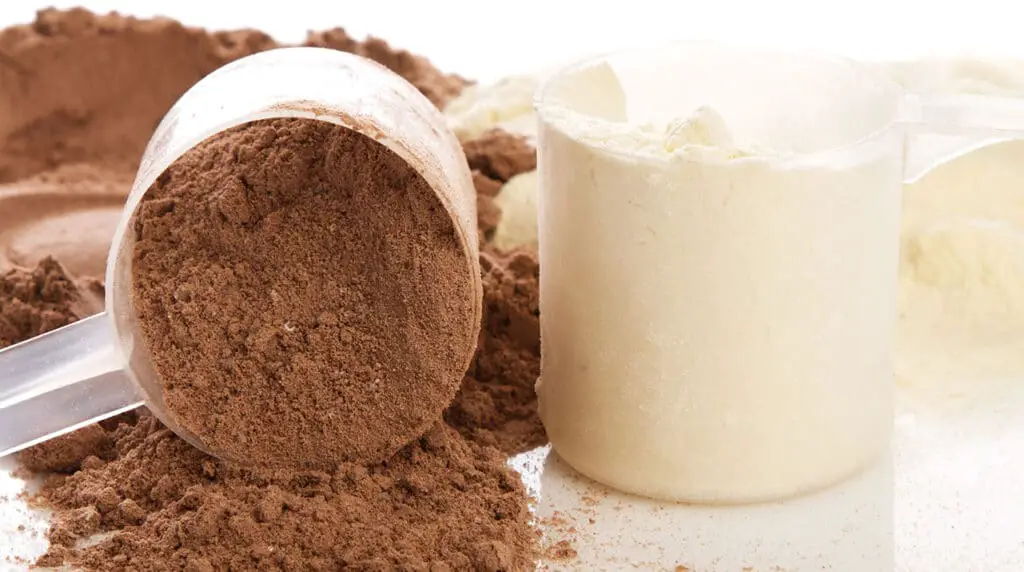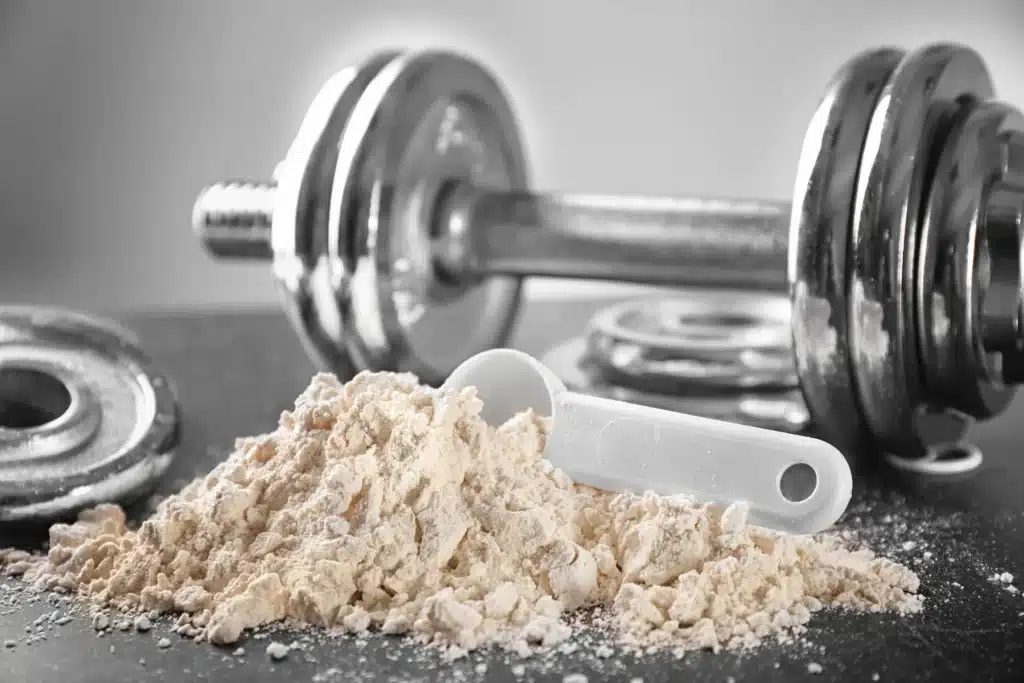Introduction
What Does Protein Powder Do For Weight Loss: Protein powder has gained immense popularity in the realm of weight loss and fitness, serving as a potent tool in the pursuit of shedding unwanted pounds and sculpting a leaner physique. Essentially, protein powder is a concentrated source of protein derived from various sources such as whey, casein, soy, or plant-based proteins, and it plays a pivotal role in supporting weight loss efforts in several ways.
First and foremost, protein is renowned for its ability to enhance feelings of fullness and satiety. When consumed as part of a balanced diet, protein powder can help curb appetite, reduce the overall caloric intake, and prevent overeating, a critical aspect of any successful weight loss journey.
Protein powder is instrumental in preserving and building lean muscle mass. As individuals reduce their calorie intake to shed weight, they risk losing muscle along with fat. However, the high protein content in these supplements helps maintain muscle tissue, ensuring that the weight lost primarily comprises fat, thereby promoting a leaner and more toned appearance.

When should I take protein powder to lose weight?
There is no set time when to take it because it depends on whether you intend to lose weight, build muscle mass, tone and build lean muscle, or preserve muscle. For weight loss, it’s beneficial to consume enough protein powder or shakes in the morning when your body needs fuel.
The timing of when to take protein powder can indeed depend on your specific fitness goals, including weight loss.
Morning: Starting your day with a protein shake can be beneficial. It can help kickstart your metabolism, provide your body with essential nutrients after a night’s rest, and help you feel full, potentially reducing cravings and overeating later in the day.
PreWorkout: Consuming protein before a workout can provide your muscles with the necessary amino acids for energy and recovery. It can also help prevent muscle breakdown during exercise, which can be particularly useful if you engage in strength training or intense workouts as part of your weight loss regimen.
PostWorkout: After your workout, your muscles are primed to absorb nutrients, including protein, for recovery and growth. Consuming protein powder within an hour after exercise can aid muscle repair and enhance the fat-burning process.
Meal Replacement: Some people opt to replace one of their daily meals with a protein shake. This can help control calorie intake while ensuring you get a balanced dose of protein and other nutrients.
Snacks: Protein shakes or protein-rich snacks can be consumed as healthy snacks between meals to curb hunger and prevent unhealthy snacking on high-calorie foods.
Is protein powder actually good for weight loss?
Protein shakes are a convenient option offering weight-loss benefits like increased satiety and muscle preservation. However, they may also pose risks if you have allergies or digestive issues. While protein shakes can be included in a healthy weight-loss plan, they shouldn’t be used as a replacement for whole foods.
Protein powder can be a valuable component of a weight loss plan when used appropriately. Here are some key points to consider regarding its role in weight loss.
Satiety: Protein is known for its ability to promote feelings of fullness and satiety. Consuming protein powder, such as in the form of protein shakes, can help control appetite and reduce overall calorie intake, which is beneficial for weight loss.
Muscle Preservation: When you are in a caloric deficit to lose weight, there is a risk of losing muscle along with fat. Protein powder can help preserve lean muscle mass, which is crucial for maintaining a healthy metabolism and achieving a toned appearance during weight loss.
Convenience: Protein shakes are a convenient and portable option, making it easier to meet your daily protein requirements, especially for individuals with busy lifestyles.
Post-Workout Recovery: Protein shakes are commonly consumed after workouts to support muscle recovery and growth, which can be important for maintaining workout consistency during a weight loss journey.
Dietary Preferences: Protein powder can be a helpful supplement for those who have specific dietary preferences or restrictions, such as vegetarians or vegans, who may struggle to meet their protein needs through whole food sources alone.
Should I take protein powder before or after a workout for weight loss?
Should you drink a protein shake before or after a workout? While there’s a lot of debates on the best time to drink your protein shake, Patton recommends that you drink it after your workout. “You’re going to get the most bang for your buck,” she says. “Your body is going to utilize more of that protein.
Protein Shake Before a Workout:
Energy: Consuming a protein shake before your workout can provide your body with a readily available source of amino acids, which can be used for energy during your exercise session.
Muscle Preservation: It can help prevent muscle breakdown during your workout, especially if you engage in resistance training or high-intensity workouts.
Satiety: The protein shake can help control hunger and cravings during your exercise session, potentially leading to a more effective workout.
Individual Preference: Some individuals find that having a protein shake before a workout gives them the energy and motivation needed for their training.
Protein Shake After a Workout:
Recovery: Consuming a protein shake after your workout is often recommended because it provides your muscles with the essential amino acids needed for recovery and repair.
Muscle Growth: Post-workout protein intake is crucial for muscle growth and repair, which can be beneficial if you are looking to build or preserve lean muscle mass during weight loss.
Nutrient Timing: The period immediately after a workout is known as the “anabolic window,” during which your muscles are more receptive to nutrients. Consuming protein during this time can optimize muscle protein synthesis.
Convenience: Some people find it more convenient to have a protein shake after their workout as part of their post-exercise routine.
How often should you drink protein shakes to lose weight?
People should only consume one or two protein shakes daily and for a short time only. It is also best to choose a protein shake that fulfills part of a healthful diet. For instance, a person who does not eat many vegetables might choose a meal replacement protein shake that contains vegetables.
The frequency of consuming protein shakes as part of a weight loss plan should be guided by your overall dietary and nutritional needs.
Daily Protein Intake: The number of protein shakes you consume should be determined by your daily protein intake goal. It’s essential to calculate your protein needs based on factors like age, gender, activity level, and weight loss goals. Protein shakes should supplement your daily protein intake, not replace whole food sources of protein.
Meal Replacement: Protein shakes can be used as meal replacements, especially if they are nutritionally balanced and contain a variety of essential nutrients. This can be helpful for those looking to control calorie intake as part of their weight loss strategy. However, it’s advisable to use meal replacement shakes for a short period and under the guidance of a healthcare professional or dietitian.
PostWorkout: Many individuals choose to consume a protein shake after their workouts to support muscle recovery and growth. If you exercise regularly, you may have a protein shake on workout days.
Satiation and Snacking: Protein shakes can also be used as snacks or to curb hunger between meals. If you find that a protein shake helps control your appetite and prevents overeating, you can incorporate it into your daily routine in this way.
Variety: While protein shakes can be convenient, it’s crucial to maintain variety in your diet. Relying solely on protein shakes for an extended period can result in a lack of essential nutrients from whole foods.
Should I drink protein at day or night for weight loss?
Taking between 30-40 grams of protein before bed can promote weight loss and muscle regeneration and development due to muscle protein synthesis, which is the biological process of building new protein cells to rebuild and repair muscle tissue via amino acids.
Consuming protein at night, specifically before bed, can have several potential benefits for weight loss and overall muscle health. Here’s why having a protein source before bedtime can be advantageous.
Muscle Protein Synthesis: As you mentioned, consuming protein before bed can support muscle protein synthesis (MPS). During sleep, your body undergoes natural repair and recovery processes, and providing it with amino acids from protein can enhance this muscle repair and growth.
Satiety: Protein is known to promote feelings of fullness and satiety. Having a protein rich snack before bed may help control nighttime hunger and reduce the likelihood of late-night snacking on high-calorie, less nutritious foods.
Metabolism: Consuming protein before bed can potentially boost your metabolism. The thermic effect of food (TEF) is the energy expenditure associated with digesting and metabolizing nutrients, and protein has a higher TEF compared to carbohydrates and fats. This means that your body burns more calories to process protein, even during sleep.
Blood Sugar Control: Protein can help stabilize blood sugar levels, which is essential for weight management. It can prevent nighttime blood sugar spikes and crashes, helping you maintain steady energy levels and reduce cravings.
Preservation of Lean Muscle Mass: During weight loss, it’s crucial to preserve lean muscle mass. Having protein before bed can aid in this process by providing your muscles with a steady supply of amino acids, reducing the risk of muscle loss.
Aim for a moderate protein intake, typically around 30-40 grams, but this can vary based on individual factors like body weight and activity level.
Choose sources of protein that are easily digestible, such as lean meats, poultry, fish, dairy products, or plant-based options like tofu, Greek yogurt, or cottage cheese.
Incorporate protein into a balanced evening snack or mini-meal rather than consuming it right before sleep if that works better for your schedule.
If you find that consuming protein before bed makes you feel uncomfortable or disrupts your sleep, adjust your timing or reduce the portion size.
How many times a day should I drink protein powder to lose weight?
The American Council on Exercise recommends that people who are trying to lose weight consume 0.36 grams of protein per pound of body weight (or about 54 grams for a 150-pound person). This means that you would need to drink one or two protein shakes per day to meet your protein needs.
Assess Your Whole Food Protein Intake: Consider how much protein you are already getting from whole food sources in your regular meals and snacks. This could include lean meats, poultry, fish, dairy products, legumes, and other protein-rich foods.
Use Protein Shakes as Supplements: Protein shakes should be used to supplement your protein intake and help you meet your daily goal. If, after considering your whole food protein sources, you find that you need additional protein to reach your target, you can incorporate one or two protein shakes per day to fill the gap.
Spread Protein Intake: You can choose to consume your protein shakes at different times of the day, such as before or after workouts, as a snack, or even before bedtime if it suits your schedule and dietary preferences.
Monitor Your Progress: Keep track of your weight loss progress and how your body responds to your protein intake. Adjust the number of protein shakes you consume based on your results and how well you are meeting your protein goals.
What to mix protein powder with for weight loss?
If you really want to maximize your protein intake without eating four steaks a day, I’d recommend mixing protein powder with milk for the best results, including weight loss. Because milk contains protein, it’s a great base for a protein powder drink.
Mixing protein powder with milk can indeed be a nutritious and satisfying option for those aiming to enhance protein intake while supporting weight loss. Here are some reasons why milk can be a good choice as a mixer for protein powder.
Protein Content: Milk is a natural source of protein, primarily containing both whey and casein proteins. Combining milk with protein powder boosts the protein content of your shake, which can aid in satiety, muscle preservation, and overall weight loss.
Nutrient Density: Milk is not only rich in protein but also provides essential vitamins and minerals, such as calcium, vitamin D, and potassium. These nutrients are important for bone health, overall well-being, and can complement a balanced diet during weight loss.
Satiety: The combination of protein from both the powder and milk can help you feel fuller for longer, potentially reducing overall calorie intake and curbing hunger cravings.
Taste and Texture: Mixing protein powder with milk can create a creamier and more enjoyable texture compared to water. This can make your protein shake taste better, making it a more satisfying addition to your diet.
Post-Workout Recovery: Consuming protein powder mixed with milk after a workout can provide your muscles with a quick supply of amino acids for recovery and growth.
Is it OK to mix coffee with protein powder?
Adding protein powder to your coffee is an excellent way to cut extra sugar and calories from creamers. Don’t go too crazy with coffee – drinking two pots in one day is not good for you. But a cup or two of coffee with protein powder is a great choice.
Yes, it is perfectly fine to mix coffee with protein powder. This combination can be a convenient and tasty way to boost your protein intake, especially if you enjoy coffee and are looking to add more protein to your diet. Here are some considerations when mixing coffee with protein powder:
Flavor Enhancement: Adding protein powder to your coffee can enhance the flavor and give it a creamy texture, making it a satisfying and nutritious option for those who prefer a creamier coffee.
Protein Intake: This combination can be an excellent way to increase your protein intake, which can aid in muscle preservation, satiety, and overall dietary balance.
Reduced Sugar and Calories: If you typically add sugar or creamers to your coffee, using protein powder can help you reduce added sugars and calories while still enjoying a flavorful beverage.
Convenience: It’s a quick and convenient way to prepare a protein-rich drink, which can be especially useful for those with busy lifestyles.
Here’s how you can make a protein coffee.
Ingredients:
- 1 cup of brewed coffee (hot or cold)
- 1 scoop of protein powder (flavor of your choice)
- Optional: Sweetener or flavorings (e.g., stevia, vanilla extract)
- Optional: A splash of milk or milk alternative for added creaminess
Instructions:
- Brew your coffee as you normally would.
- While the coffee is still hot, add a scoop of protein powder to the cup. You can also use a blender to mix the coffee and protein powder for a smoother consistency.
- Stir or shake vigorously until the protein powder is fully dissolved.
- If desired, add sweetener or flavorings to taste.
- Optionally, add a splash of milk or milk alternative if you prefer a creamier texture.
- Enjoy your protein coffee!

Conclusion
First and foremost, protein powder is a powerful tool for promoting satiety and controlling appetite. The increased feelings of fullness it provides can help reduce overall calorie intake, a fundamental aspect of any successful weight loss journey. Moreover, by curbing cravings and preventing unhealthy snacking, protein powder supports better dietary choices.
Protein powder plays a crucial role in preserving lean muscle mass. During weight loss, when calorie intake is reduced, there’s a risk of losing muscle along with fat. Protein powder, with its amino acids, supports muscle recovery, growth, and maintenance, ensuring that the weight lost primarily comprises fat.
Protein powder can enhance post-workout recovery, boost metabolism through the thermic effect of food, and stabilize blood sugar levels. These benefits collectively contribute to more effective and sustainable weight loss. Calculate Your Daily Protein Goal: Determine your daily protein intake goal based on your body weight and the recommended protein intake. For example, if you weigh 150 pounds, you would aim for about 54 grams of protein per day (150 pounds x 0.36 grams/pound).


2 comments
… [Trackback]
[…] There you can find 25353 additional Info on that Topic: thefitnessblogger.com/what-does-protein-powder-do-for-weight-loss/ […]
… [Trackback]
[…] Find More Info here on that Topic: thefitnessblogger.com/what-does-protein-powder-do-for-weight-loss/ […]